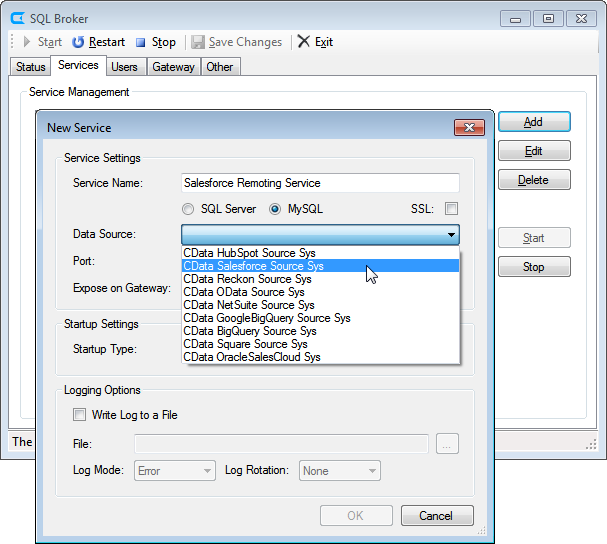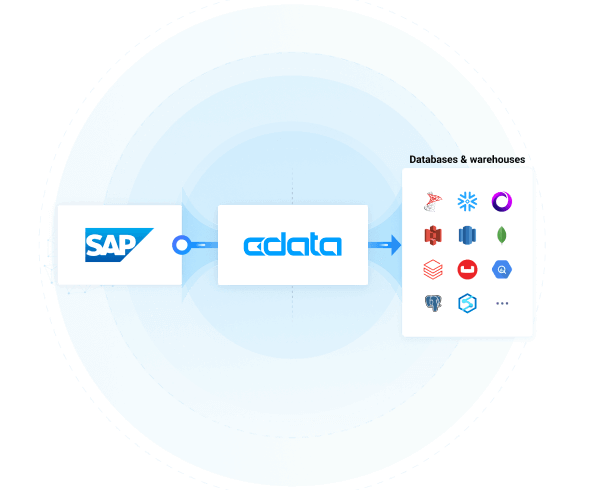Discover how a bimodal integration strategy can address the major data management challenges facing your organization today.
Get the Report →How to create WooCommerce federated tables in MySQL
Use the SQL Gateway and the ODBC Driver to set up federated tables for WooCommerce data in MySQL .
You can use the SQL Gateway to configure a MySQL remoting service and set up federated tables for WooCommerce data. The service is a daemon process that provides a MySQL interface to the CData ODBC Driver for WooCommerce: After you have started the service, you can create a server and tables using the FEDERATED Storage Engine in MySQL. You can then work with WooCommerce data just as you would local MySQL tables.
Connect to WooCommerce Data
If you have not already done so, provide values for the required connection properties in the data source name (DSN). You can use the built-in Microsoft ODBC Data Source Administrator to configure the DSN. This is also the last step of the driver installation. See the "Getting Started" chapter in the help documentation for a guide to using the Microsoft ODBC Data Source Administrator to create and configure a DSN.
WooCommerce supports the following authentication methods: one-legged OAuth1.0 Authentication and standard OAuth2.0 Authentication.
Connecting using one-legged OAuth 1.0 Authentication
Specify the following properties (NOTE: the below credentials are generated from WooCommerce settings page and should not be confused with the credentials generated by using WordPress OAuth2.0 plugin):
- ConsumerKey
- ConsumerSecret
Connecting using WordPress OAuth 2.0 Authentication
After having configured the plugin, you may connect to WooCommerce by providing the following connection properties:
In either case, you will need to set the Url property to the URL of the WooCommerce instance.
See the SQL Gateway Overview to set up connectivity to WooCommerce data as a virtual MySQL database. You will configure a MySQL remoting service that listens for MySQL requests from clients. The service can be configured in the SQL Gateway UI.
After you have configured and started the service, create a FEDERATED server to simplify the process of creating FEDERATED tables:
The following statement will create a FEDERATED server based on the ODBC Driver for WooCommerce. Note that the username and password of the FEDERATED server must match a user account you defined on the Users tab of the SQL Gateway.
To create a FEDERATED table using our newly created server, use the CONNECTION keyword and pass the name of the FEDERATED server and the remote table (Orders). Refer to the following template for the statement to create a FEDERATED table:
NOTE: The table schema for the FEDERATED table must match the remote table schema exactly. You can always connect directly to the MySQL remoting service using any MySQL client and run a SHOW CREATE TABLE query to get the table schema.
You can now execute queries to the WooCommerce FEDERATED tables from any tool that can connect to MySQL, which is particularly useful if you need to JOIN data from a local table with data from WooCommerce. Refer to the following example:
Configure the SQL Gateway

Create a FEDERATED Server and Tables for WooCommerce Data
Create a FEDERATED Server
CREATE SERVER fedWooCommerce
FOREIGN DATA WRAPPER mysql
OPTIONS (USER 'sql_gateway_user', PASSWORD 'sql_gateway_passwd', HOST 'sql_gateway_host', PORT ####, DATABASE 'CData WooCommerce Sys');
Create a FEDERATED Table
CREATE TABLE fed_orders (
...,
parentid TYPE(LEN),
total TYPE(LEN),
...,
)
ENGINE=FEDERATED
DEFAULT CHARSET=latin1
CONNECTION='fedWooCommerce/orders';
Execute Queries
SELECT
fed_orders.parentid,
local_table.custom_field
FROM
local_table
JOIN
fed_orders
ON
local_table.foreign_parentid = fed_orders.parentid;





